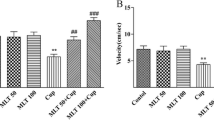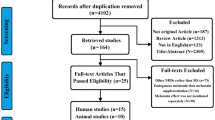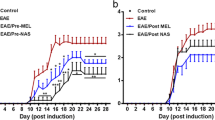Abstract
Multiple sclerosis (MS) is a progressive chronic inflammatory autoimmune disease of the myelin sheath, and melatonin is a powerful antioxidant and anti-inflammatory agent. The present study evaluated the protective effect of melatonin on demyelination and remyelination processes in male and female mice with experimental MS induced by cuprizone. This model of experimental MS in mice is widely used because cuprizone administration causes an artificial demyelination reaction through oligodendrocyte apoptosis, while its withdrawal leads to spontaneous remyelination. Male and female SWR/J mice (n = 78) were divided into three main groups (control, cuprizone, and cuprizone + melatonin), which were each further subdivided into males and females. Cuprizone was orally administered at a dose of 400 mg/kg/day by oral gavage for 5 weeks. In addition, melatonin was intraperitoneally administered for 9 weeks at a dose of 80 mg/kg/day. During the demyelination stage, melatonin exhibited a neuroprotective function in both male and female mice. This was evidenced by improved locomotor activity, increased antioxidant levels (catalase, superoxide dismutase, glutathione peroxidase, and glutathione), and reduced levels of malondialdehyde and inflammatory factors (interleukin-1 beta and tumor necrosis factor-alpha) in male and female mice. However, the effect of melatonin during the remyelination stage varied between sexes; male mice experienced protective effects following melatonin administration, whereas no effect was observed in female mice. These results suggest a complex interaction involving exogenous melatonin, remyelination, and endogenous female sex hormones.









Similar content being viewed by others
References
Adamczyk B, Adamczyk-Sowa M (2016) New insights into the role of oxidative stress mechanisms in the pathophysiology and treatment of multiple sclerosis. Oxidative Med Cell Longev 2016:1973834. https://doi.org/10.1155/2016/1973834
Adamczyk-Sowa M, Pierzchala K, Sowa P, Polaniak R, Kukla M, Hartel M (2014) Influence of melatonin supplementation on serum antioxidative properties and impact of the quality of life in multiple sclerosis patients. J Physiol Pharmacol 65:543–550
Adamczyk-Sowa M, Sowa P, Adamczyk J, Niedziela N, Misiolek H, Owczarek M, Zwirska-Korczala K (2016) Effect of melatonin supplementation on plasma lipid hydroperoxides, homocysteine concentration and chronic fatigue syndrome in multiple sclerosis patients treated with interferons-beta and mitoxantrone. J Physiol Pharmacol 67:235–242
Adamczyk-Sowa M, Galiniak S, Żyracka E, Grzesik M, Naparło K, Sowa P, Bartosz G, Sadowska-Bartosz I (2017) Oxidative modification of blood serum proteins in multiple sclerosis after interferon beta and melatonin treatment. Oxidative Med Cell Longev 2017:7905148. https://doi.org/10.1155/2017/7905148
Alghamdi B (2018) The neuroprotective role of melatonin in neurological disorders. J Neurosci Res 96:1136–1149. https://doi.org/10.1002/jnr.24220
Álvarez-Sánchez N, Cruz-Chamorro I, López-González A, Utrilla JC, Fernández-Santos JM, Martínez-López A, Lardone PJ, Guerrero JM, Carrillo-Vico A (2015) Melatonin controls experimental autoimmune encephalomyelitis by altering the T effector/regulatory balance. Brain Behav Immun 50:101–114. https://doi.org/10.1016/j.bbi.2015.06.021
Álvarez-Sánchez N, Cruz-Chamorro I, Díaz-Sánchez M, Sarmiento-Soto H, Medrano-Campillo P, Martínez-López A, Lardone PJ, Guerrero JM, Carrillo-Vico A (2017) Melatonin reduces inflammatory response in peripheral T helper lymphocytes from relapsing-remitting multiple sclerosis patients. J Pineal Res 63:e12442. https://doi.org/10.1111/jpi.12442
Anderson G, Rodriguez M (2015) Multiple sclerosis: the role of melatonin and N-acetylserotonin. Mult Scler Relat Disord 4:112–123. https://doi.org/10.1016/j.msard.2014.12.001
Anisimov VN, Popovich IG, Zabezhinski MA, Anisimov SV, Vesnushkin GM, Vinogradova IA (2006) Melatonin as antioxidant, geroprotector and anticarcinogen. Biochim Biophys Acta 1757:573–589. https://doi.org/10.1016/j.bbabio.2006.03.012
Balkaya M, Kröber JM, Rex A, Endres M (2013) Assessing post-stroke behavior in mouse models of focal ischemia. J Cereb Blood Flow Metab 33:330–338. https://doi.org/10.1038/jcbfm.2012.185.
Benetti F, Ventura M, Salmini B, Ceola S, Carbonera D, Mammi S, Zitolo A, D’Angelo P, Urso E, Maffia M, Salvato B, Spisni E (2010) Cuprizone neurotoxicity, copper deficiency and neurodegeneration. Neurotoxicology 31:509–517. https://doi.org/10.1016/j.neuro.2010.05.008
Blakemore WF (1973) Demyelination of the superior cerebellar peduncle in the mouse induced by cuprizone. J Neurol Sci 20:63–72. https://doi.org/10.1016/0022-510X(73)90118-4
Borrás C, Gambini J, López-Grueso R, Pallardó FV, Viña J (2010) Direct antioxidant and protective effect of estradiol on isolated mitochondria. Biochim Biophys Acta 1802:205–211. https://doi.org/10.1016/j.bbadis.2009.09.007
Browne P, Chandraratna D, Angood C, Tremlett H, Baker C, Taylor BV, Thompson AJ (2014) Atlas of multiple sclerosis 2013: A growing global problem with widespread inequity. Neurology 83:1022–1024. https://doi.org/10.1212/WNL.0000000000000768
Chami M, Halmer R, Schnoeder L, Becker KA, Meier C, Fassbender K, Gulbins E, Walter S (2017) Acid sphingomyelinase deficiency enhances myelin repair after acute and chronic demyelination. PLoS One 12:e0178622. https://doi.org/10.1371/journal.pone.0178622
Delgado D, Canham L, Cotterill N, Cottrell D, Drake MJ, Inglis K, Owen D, White P (2017) Protocol for a randomized, double blind, placebo controlled, crossover trial of melatonin for treatment of nocturia in adults with multiple sclerosis (MeNiMS). BMC Neurol 17:63. https://doi.org/10.1186/s12883-017-0845-y
Eghbal MA, Eftekhari A, Ahmadian E, Azarmi Y, Parvizpur A (2016) A review of biological and pharmacological actions of melatonin: oxidant and prooxidant properties. Pharm Bioprocess 4:69–81
Elbaz EM, Senousy MA, El-Tanbouly DM, Sayed RH (2018) Neuroprotective effect of linagliptin against cuprizone-induced demyelination and behavioural dysfunction in mice: a pivotal role of AMPK/SIRT1 and JAK2/STAT3/NF-kappaB signalling pathway modulation. Toxicol Appl Pharmacol 352:153–161. https://doi.org/10.1016/j.taap.2018.05.035
Faizi M, Salimi A, Seydi E, Naserzadeh P, Kouhnavard M, Rahimi A, Pourahmad J (2016) Toxicity of cuprizone a Cu2+ chelating agent on isolated mouse brain mitochondria: a justification for demyelination and subsequent behavioral dysfunction. Toxicol Mech Methods 26:276–283. https://doi.org/10.3109/15376516.2016.1172284
Franco-Pons N, Torrente M, Colomina MT, Vilella E (2007) Behavioral deficits in the cuprizone-induced murine model of demyelination/remyelination. Toxicol Lett 169:205–213. https://doi.org/10.1016/j.toxlet.2007.01.010
Galano A, Tan DX, Reiter RJ (2011) Melatonin as a natural ally against oxidative stress: a physicochemical examination. J Pineal Res 51:1–16. https://doi.org/10.1111/j.1600-079X.2011.00916.x
Ghareghani M, Sadeghi H, Zibara K, Danaei N, Azari H, Ghanbari A (2017) Melatonin increases oligodendrocyte differentiation in cultured neural stem cells. Cell Mol Neurobiol 37:1319–1324. https://doi.org/10.1007/s10571-016-0450-4
Ghareghani M, Zibara K, Sadeghi H, Farhadi N (2018) Spasticity treatment ameliorates the efficacy of melatonin therapy in experimental autoimmune encephalomyelitis (eae) mouse model of multiple sclerosis. Cell Mol Neurobiol 38:1145–1151. https://doi.org/10.1007/s10571-018-0580-y
Ghareghani M, Scavo L, Jand Y, Farhadi N, Sadeghi H, Ghanbari A, Mondello S, Arnoult D, Gharaghani S, Zibara K (2019) Melatonin therapy modulates cerebral metabolism and enhances remyelination by increasing PDK4 in a mouse model of multiple sclerosis. Front Pharmacol 10:147. https://doi.org/10.3389/fphar.2019.00147
Ghasemi N, Razavi S, Nikzad E (2017) Multiple sclerosis: pathogenesis, symptoms, diagnoses and cell-based therapy. Cell J 19:1–10. https://doi.org/10.22074/cellj.2016.4867
Goldenberg MM (2012) Multiple sclerosis review. P T 37:175–184
Hacışevki A, Baba B (2018) An overview of melatonin as an antioxidant molecule: a biochemical approach. In: Drăgoi CM and Nicolae AC (eds), Melatonin–molecular biology, clinical and pharmaceutical approaches. IntechOpen, Available from: https://www.intechopen.com/books/melatonin-molecular-biology-clinical-and-pharmaceutical-approaches/an-overview-of-melatonin-as-an-antioxidant-molecule-a-biochemical-approach
Hardeland R, Pandi-Perumal S (2005) Melatonin, a potent agent in antioxidative defense: actions as a natural food constituent, gastrointestinal factor, drug and prodrug. Nutr Metab (Lond) 2:22. https://doi.org/10.1186/1743-7075-2-22
Herring NR, Konradi C (2011) Myelin, copper, and the cuprizone model of schizophrenia. Front Biosci (Schol Ed) 3:23–40
Hibbits N, Yoshino J, Le TQ, Armstrong RC (2012) Astrogliosis during acute and chronic cuprizone demyelination and implications for remyelination. ASN Neuro 4:393–403. https://doi.org/10.1042/AN20120062
Høglund RA, Maghazachi AA (2014) Multiple sclerosis and the role of immune cells. World J Exp Med 4:27–37. https://doi.org/10.5493/wjem.v4.i3.27
Jäkel S, Dimou L (2017) Glial cells and their function in the adult brain: a journey through the history of their ablation. Front Cell Neurosci 11:24. https://doi.org/10.3389/fncel.2017.00024
Jimenez-Caliani AJ, Jimenez-Jorge S, Molinero P, Fernandez-Santos JM, Martin-Lacave I, Rubio A, Guerrero JM, Osuna C (2006) Sex-dependent effect of melatonin on systemic erythematosus lupus developed in Mrl/Mpj-Faslpr mice: it ameliorates the disease course in females, whereas it exacerbates it in males. Endocrinology 147:1717–1724. https://doi.org/10.1210/en.2005-0648
Kamm CP, Uitdehaag BM, Polman CH (2014) Multiple sclerosis: current knowledge and future outlook. Eur Neurol 72:132–141. https://doi.org/10.1159/000360528
Kander MC, Cui Y, Liu Z (2017) Gender difference in oxidative stress: a new look at the mechanisms for cardiovascular diseases. J Cell Mol Med 21:1024–1032. https://doi.org/10.1111/jcmm.13038
Kashani IR, Rajabi Z, Akbari M, Hassanzadeh G, Mohseni A, Eramsadati MK, Rafiee K, Beyer C, Kipp M, Zendedel A (2014) Protective effects of melatonin against mitochondrial injury in a mouse model of multiple sclerosis. Exp Brain Res 232:2835–2846. https://doi.org/10.1007/s00221-014-3946-5
Kipp M, Clarner T, Dang J, Copray S, Beyer C (2009) The cuprizone animal model: new insights into an old story. Acta Neuropathol 118:723–736. https://doi.org/10.1007/s00401-009-0591-3
Kremer D, Akkermann R, Küry P, Dutta R (2019) Current advancements in promoting remyelination in multiple sclerosis. Mult Scler 25:7–14. https://doi.org/10.1177/1352458518800827
Labunets I, Rodnichenko A, Melnyk N, Utko N (2018) Neuroprotective effect of melatonin in mice with toxic cuprizone model of demyelination and possible pathways of its realization. Cell Organ Transplantol 6:145–151. https://doi.org/10.22494/cot.v6i2.87
Lahiri S, Singh P, Singh S, Rasheed N, Palit G, Pant K (2009) Melatonin protects against experimental reflux esophagitis. J Pineal Res 46:207–213. https://doi.org/10.1111/j.1600-079X.2008.00650.x
Lan W, He L, Liu Y (2018) Preparation and properties of sodium carboxymethyl cellulose/sodium alginate/chitosan composite film. Coatings 8:291. https://doi.org/10.3390/coatings8080291
Lopes J, Arnosti D, Trosko JE, Tai M-H, Zuccari D (2016) Melatonin decreases estrogen receptor binding to estrogen response elements sites on the OCT4 gene in human breast cancer stem cells. Genes Cancer 7:209–217. https://doi.org/10.18632/genesandcancer.107
Ma Q (2013) Role of Nrf2 in oxidative stress and toxicity. Annu Rev Pharmacol Toxicol 53:401–426. https://doi.org/10.1146/annurev-pharmtox-011112-140320
Mohammed EM (2016) Multiple sclerosis is prominent in the Gulf states. Pathogenesis 3:19–38. https://doi.org/10.1016/j.pathog.2016.04.001
Moldovan N, Al-Ebraheem A, Lobo L, Park R, Farquharson MJ, Bock NA (2015) Altered transition metal homeostasis in the cuprizone model of demyelination. Neurotoxicology 48:1–8. https://doi.org/10.1016/j.neuro.2015.02.009
Morell P, Barrett C, Mason J, Toews A, Hostettler J, Knapp G, Matsushima G (1998) Gene expression in brain during cuprizone-induced demyelination and remyelination. Mol Cell Neurosci 12:220–227. https://doi.org/10.1006/mcne.1998.0715
Nabavi SM, Nabavi SF, Sureda A, Xiao J, Dehpour AR, Shirooie S, Silva AS, Baldi A, Khan H, Daglia M (2019) Anti-inflammatory effects of melatonin: a mechanistic review. Crit Rev Food Sci Nutr 59:S4–S16. https://doi.org/10.1080/10408398.2018.1487927
Nakahara J (2017) Remyelination in multiple sclerosis: pathology and treatment strategies. Clin Exp Neuroimmunol 8:40–46. https://doi.org/10.1111/cen3.12349
Olcese JM, Cao C, Mori T, Mamcarz MB, Maxwell A, Runfeldt MJ, Wang L, Zhang C, Lin X, Zhang G, Arendash GW (2009) Protection against cognitive deficits and markers of neurodegeneration by long-term oral administration of melatonin in a transgenic model of Alzheimer disease. J Pineal Res 47:82–96. https://doi.org/10.1111/j.1600-079X.2009.00692.x
Olivier P, Fontaine RH, Loron G, Van Steenwinckel J, Biran V, Massonneau V, Kaindl A, Dalous J, Charriaut-Marlangue C, Aigrot MS, Pansiot J, Verney C, Gressens P, Baud O (2009) Melatonin promotes oligodendroglial maturation of injured white matter in neonatal rats. PLoS One 4:e7128. https://doi.org/10.1371/journal.pone.0007128
Omotoso GO, Gbadamosi IT, Afolabi TT, Abdulwahab AB, Akinlolu AA (2018) Ameliorative effects of moringa on cuprizone-induced memory decline in rat model of multiple sclerosis. Anat Cell Biol 51:119–127. https://doi.org/10.5115/acb.2018.51.2.119
Ortiz GG, Pacheco-Moisés FP, Torres-Sánchez ED, Sorto-Gómez TE, Mireles-Ramírez M, León-Gil A, González-Usigli H, Flores-Alvarado LJ, González-Renovato ED, Sánchez-López AL (2016) Multiple sclerosis and its relationship with oxidative stress, glutathione redox system, atpase system, and membrane fluidity. In: Gonzalez-Quevedo A (ed) Trending topics in multiple sclerosis. IntechOpen. Available from: https://www.intechopen.com/books/trending-topics-in-multiple-sclerosis/multiple-sclerosis-and-its-relationship-with-oxidative-stress-glutathione-redox-system-atpase-system.
Osorio-Querejeta I, Sáenz-Cuesta M, Muñoz-Culla M, Otaegui D (2017) Models for studying myelination, demyelination and remyelination. NeuroMolecular Med 19:181–192. https://doi.org/10.1111/j.1600-079X.2009.00692.x
Palumbo S, Toscano CD, Parente L, Weigert R, Bosetti F (2011) Time-dependent changes in the brain arachidonic acid cascade during cuprizone-induced demyelination and remyelination. Prostaglandins Leukot Essent Fat Acids 85:29–35. https://doi.org/10.1016/j.plefa.2011.04.001
Pfeifenbring S, Nessler S, Wegner C, Stadelmann C, Brück W (2015) Remyelination after cuprizone-induced demyelination is accelerated in juvenile mice. J Neuropathol Exp Neurol 74:756–766. https://doi.org/10.1097/NEN.0000000000000214
Piera T, Francesco A, Pasquale F, Angelo DM, Anna S, Simone B (2015) Multiple sclerosis: effect of oral administration of an antioxidant dietary supplement in C57BL6/N induced model of experimental autoimmune encephalomyelitis. American Journal of Clinical and Experimental Medicine 3:83–87. https://doi.org/10.11648/j.ajcem.20150303.12
Ponath G, Park C, Pitt D (2018) The role of astrocytes in multiple sclerosis. Front Immunol 9:217. https://doi.org/10.3389/fimmu.2018.00217
Praet J, Guglielmetti C, Berneman Z, Van der Linden A, Ponsaerts P (2014) Cellular and molecular neuropathology of the cuprizone mouse model: clinical relevance for multiple sclerosis. Neurosci Biobehav Rev 47:485–505. https://doi.org/10.1016/j.neubiorev.2014.10.004
Prunet-Marcassus B, Desbazeille M, Bros A, Louche K, Delagrange P, Renard P, Casteilla L, Pénicaud L (2003) Melatonin reduces body weight gain in Sprague-Dawley rats with diet-induced obesity. Endocrinology 144:5347–5352. https://doi.org/10.1210/en.2003-0693
Raghavendra V, Singh V, Shaji A, Vohra H, Kulkarni S, Agrewala J (2001) Melatonin provides signal 3 to unprimed CD4+ T cells but failed to stimulate LPS primed B cells. Clin Exp Immunol 124:414–422. https://doi.org/10.1046/j.1365-2249.2001.01519.x
Reiter RJ, Tan DX, Mayo JC, Sainz RM, Leon J, Czarnocki Z (2003) Melatonin as an antioxidant: biochemical mechanisms and pathophysiological implications in humans. Acta Biochim Pol 50:1129–1146 https://doi.org/0350041129
Reiter RJ, Tan D-X, Galano A (2014) Melatonin reduces lipid peroxidation and membrane viscosity. Front Physiol 5:377. https://doi.org/10.3389/fphys.2014.00377
Sachs HH, Bercury KK, Popescu DC, Narayanan SP, Macklin WB (2014) A new model of cuprizone-mediated demyelination/remyelination. ASN Neuro 6:1759091414551955. https://doi.org/10.1177/1759091414551955
Steelman AJ, Thompson JP, Li J (2012) Demyelination and remyelination in anatomically distinct regions of the corpus callosum following cuprizone intoxication. Neurosci Res 72:32–42. https://doi.org/10.1016/j.neures.2011.10.002
Stidworthy MF, Genoud S, Suter U, Mantei N, Franklin RJ (2003) Quantifying the early stages of remyelination following cuprizone-induced demyelination. Brain Pathol 13:329–339. https://doi.org/10.1111/j.1750-3639.2003.tb00032.x
Tagge I, O’Connor A, Chaudhary P, Pollaro J, Berlow Y, Chalupsky M, Bourdette D, Woltjer R, Johnson M, Rooney W (2016) Spatio-temporal patterns of demyelination and remyelination in the cuprizone mouse model. PLoS One 11:e0152480. https://doi.org/10.1371/journal.pone.0152480
Takeshita H, Yamamoto K, Nozato S, Inagaki T, Tsuchimochi H, Shirai M, Yamamoto R, Imaizumi Y, Hongyo K, Yokoyama S, Takeda M, Oguro R, Takami Y, Itoh N, Takeya Y, Sugimoto K, Fukada SI, Rakugi H (2017) Modified forelimb grip strength test detects aging-associated physiological decline in skeletal muscle function in male mice. Sci Rep 7:42323. https://doi.org/10.1038/srep42323
Tan D-X, Manchester LC, Reiter RJ, Plummer BF, Limson J, Weintraub ST, Qi W (2000) Melatonin directly scavenges hydrogen peroxide: a potentially new metabolic pathway of melatonin biotransformation. Free Radic Biol Med 29:1177–1185. https://doi.org/10.1016/S0891-5849(00)00435-4
Tan DX, Manchester LC, Qin L, Reiter RJ (2016) Melatonin: a mitochondrial targeting molecule involving mitochondrial protection and dynamics. Int J Mol Sci 17:E2124. https://doi.org/10.3390/ijms17122124
Tómas-Zapico C, Coto-Montes A (2005) A proposed mechanism to explain the stimulatory effect of melatonin on antioxidative enzymes. J Pineal Res 39:99–104. https://doi.org/10.1111/j.1600-079X.2005.00248.x
Trenova A, Slavov G (2016) Cytokines in multiple sclerosis–possible targets for immune therapies. J Neurol Exp Neurosci 1:25–29. https://doi.org/10.17756/jnen.2016-006
Tsiperson V, Li X, Schwartz GJ, Raine CS, Shafit-Zagardo B (2010) GAS6 enhances repair following cuprizone-induced demyelination. PLoS One 5:e15748. https://doi.org/10.1371/journal.pone.0015748
Vakilzadeh G, Khodagholi F, Ghadiri T, Ghaemi A, Noorbakhsh F, Sharifzadeh M, Gorji A (2016) The effect of melatonin on behavioral, molecular, and histopathological changes in cuprizone model of demyelination. Mol Neurobiol 53:4675–4684. https://doi.org/10.1007/s12035-015-9404-y
Villapol S, Fau S, Renolleau S, Biran V, Charriaut-Marlangue C, Baud O (2011) Melatonin promotes myelination by decreasing white matter inflammation after neonatal stroke. Pediatr Res 69:51–55. https://doi.org/10.1203/PDR.0b013e3181fcb40b
Wang H, Wei W, Wang N-P, Gui S-Y, Wu L, Sun W-Y, Xu S-Y (2005) Melatonin ameliorates carbon tetrachloride-induced hepatic fibrogenesis in rats via inhibition of oxidative stress. Life Sci 77:1902–1915. https://doi.org/10.1016/j.lfs.2005.04.013
Wang J, Sui RX, Miao Q, Wang Q, Song LJ, Yu JZ, Li YH, Xiao BG, Ma CG (2019) Effect of fasudil on remyelination following cuprizone-induced demyelination. CNS Neurosci Ther. https://doi.org/10.1111/cns.13154
Zhen W, Liu A, Lu J, Zhang W, Tattersall D, Wang J (2017) An alternative cuprizone-induced demyelination and remyelination mouse model. ASN Neuro 9:1759091417725174. https://doi.org/10.1177/1759091417725174
Acknowledgments
The authors would like to extend thanks to Dr. Ayman Abbas and Dr. Umama Abdelsalam (veterinary pathologists, Animal Unit Committee, King Fahad Medical Research Center) and to Professor Najla Alshetani (Faculty of Pharmacology, King Abdul-Aziz University) for their procedural assistance and support. We thank Ryan Chastain-Gross, Ph.D., from Edanz Group (www.edanzediting.com/ac) for editing a draft of this manuscript.
Funding
This work was financially supported by King Fahad Medical Research Center and King Abdul-Aziz University, Jeddah, SA.
Author information
Authors and Affiliations
Corresponding authors
Ethics declarations
Conflict of Interest
The authors declare that they have no conflict of interest.
Ethical Approval
All animal experiments were conducted according to the guidelines of the animal unit committee at King Fahad Center for Medical Research. The study was designed in agreement with biomedical ethics research committee at King Abdul-Aziz University (Reference No. 613-18).
Additional information
Publisher’s Note
Springer Nature remains neutral with regard to jurisdictional claims in published maps and institutional affiliations.
Rights and permissions
About this article
Cite this article
Abo Taleb, H.A., Alghamdi, B.S. Neuroprotective Effects of Melatonin during Demyelination and Remyelination Stages in a Mouse Model of Multiple Sclerosis. J Mol Neurosci 70, 386–402 (2020). https://doi.org/10.1007/s12031-019-01425-6
Received:
Accepted:
Published:
Issue Date:
DOI: https://doi.org/10.1007/s12031-019-01425-6




